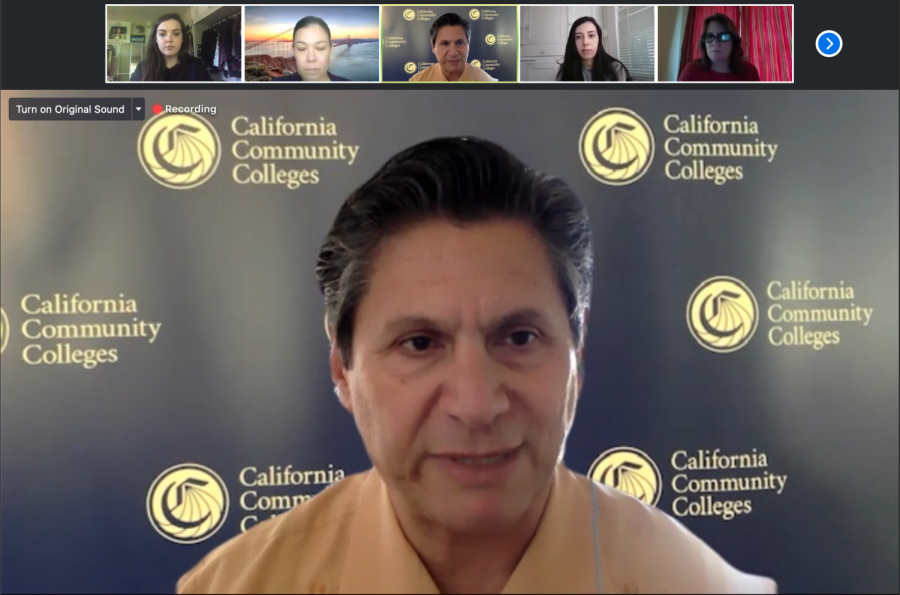COVID-19: How California Community Colleges Are Responding
Chancellor Oakley gave coronavirus updates and answered questions via Zoom conference
California Community Colleges Chancellor Eloy Ortiz Oakley held a conference via Zoom on April 12 to discuss updates on how COVID-19 is affecting students and faculty at community colleges across California. There are 115 community colleges throughout California, and the conference was attended by students from all over the Golden State.
Oakley began by praising California’s colleges. He specifically mentioned students at Cerritos College who handed out over 1,000 meals to people in need during this crisis.
The Zoom conference mainly focused on major initiatives and executive orders that have been issued. With an emphasis on the importance of the 2020 Census, Oakley’s advice to community colleges was to “prepare for this to extend into the spring of 2021.”
The first item addressed was an executive order to temporarily suspend student withdrawal regulations. Students who filed for a withdrawal before the stay at home order are able to request that their record “W” be changed to an “excused withdrawal,” Oakley said.
This was followed with explanations about decisions to have a grading policy that is more flexible for students during this time. For Example, UCs and CSUs will accept pass/no pass for courses taken during the stay at home order. Most universities will offer leniency to students planning to transfer “a few units shy of the required 60 units,” according to Marty J. Alvarado, Executive Vice Chancellor for Educational Services. It is unclear if a pass/no pass option at this juncture will become policy at Glendale College.
Oakley spoke of the CARES act, short for ‘Coronavirus Aid, Relief, and Economic Security Act,’ which was recently made into law. This law allows colleges flexibility to decide how to provide the aid to students. Glendale Community College’s total allocation is $10,056,959 with $5,028,480 of that total going towards “Emergency Financial Aid Grants to Students.”
El Vaquero reached out to Ryan Mc Elhinney, the Acting Director of Government Relations at the Community College League of California, who informed us how the funds will be distributed. “Colleges will be given broad discretion on how and who to distribute the funds – as long as they are for coronavirus related emergencies,” he said.” This could range from direct cash grants to students who may have lost their job, laptops for students who can’t afford them but are now taking online courses.”
The 2020 Census was a main issue during the conference, with emphasis from Oakley on how important it is to report yourself. He explained that participation in the census directly influences the resources and representation California receives from Washington.
“College students are at a risk of being undercounted in California … this effort is essential to get a complete count of every member of the community so that students are fairly represented by our congressional leadership and that our colleges get their fair share of federal resources for many years to come,” said Oakley.
Filling out the Census can be done online. The process takes around 10 minutes to complete.
The chancellor was questioned about the seemingly inevitable recession and how it would affect our community. He explained that in August, the Budget Committee will discuss the cuts that need to be made to education after revenues are better understood.
“The bottom line is this, one we don’t know how big of an impact this is gonna be at because we are not through this crisis, what we do know is that there will be an impact,” Oakley stated. He further explained that in previous recessions, community colleges are hit hard by budget cuts, but that he will be “advocating heavily” for funding. The chancellor also mentioned that 70% of first responders, people who are essential right now, are trained through California’s community colleges.
In an op-ed for The San Diego Union-Tribune Oakley wrote about the important function of community colleges.“Today, 70% of first responders — firefighters, police, paramedics, nurses, medical technicians and other essential workers — receive training at community colleges,” the op-ed reads.” They are out there now, working, helping, fighting and saving lives. Many others stand ready to leave our colleges and help as soon as they get licensing approval to do so.”
Oakley shared that his office is assuming that the stay at home order will extend until spring of 2021, and he is advising California community colleges to make preparations for that estimate. He remained hopeful that it will not come to that, but explains that if the stay at home order is lifted, returning to classes in the fall will not be like previous semesters.
When California Gov. Gavin Newsom lifts the order, students, faculty and staff should expect that social distancing will still be in place at the colleges. That could mean no large lecture halls and most classes taught remotely. Oakley said he wanted students to know he is confident in them and the California community college system. “We have the most resilient students in all of California higher education,” he said.
Natalie Casey can be reached at [email protected].

